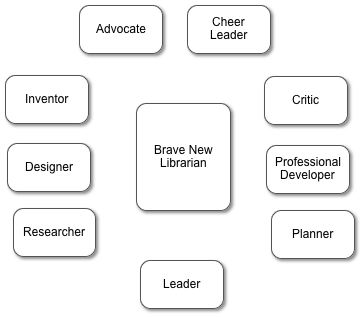| Please feel free to e-mail this article to a friend, a principal, a parent, a colleague, a teacher librarian, a college professor, a poet, a magician, a vendor, an artist, a juggler, a student, a news reporter or to anyone else you think might enjoy it. |

In many school districts suffering from budget woes and poor leadership, library staffing has been severely reduced. School librarians must take a bold stance to restore their positions to a fully funded, robust place in the operation of school districts.

|
The Brave New Librarian
By Jamie McKenzie, ©2012, all rights reserved.
About author
We need school librarians more now than ever before. And we need them to act bravely and boldly.
Why? Take a look at this article from 2010. "Why we need libraries and librarians."
With the advent of new information technologies, the challenge of making meaning and finding truth has become daunting. While we have ready access to more information, the casual reader is often overwhelmed by the mountains of data and is ironically made more dependent on artificial intelligence to guide searches.
Without well honed search strategies and a very strong grounding in information literacies, students all too often fall prey to a cut-and-paste pattern that reduces the quality and originality of thought. |
Why Brave?
 For several decades now we have seen some school leaders dismantling the library programs and cutting back the library staffing of their districts. During this period, some school librarians did not view the struggle as one of survival, and in many districts they have seen the cuts happen without putting up much of a fight. There are exceptions to this trend, but we have reached the point where all school librarians must view the threats to program and position as severe. For several decades now we have seen some school leaders dismantling the library programs and cutting back the library staffing of their districts. During this period, some school librarians did not view the struggle as one of survival, and in many districts they have seen the cuts happen without putting up much of a fight. There are exceptions to this trend, but we have reached the point where all school librarians must view the threats to program and position as severe.
 We are facing what amounts to a war against libraries and information literacy. There are ignorant and cynical forces at work trying to convince the general public that library services are not needed while we have Google helping us to find the truths we need. We are facing what amounts to a war against libraries and information literacy. There are ignorant and cynical forces at work trying to convince the general public that library services are not needed while we have Google helping us to find the truths we need.  Trained to serve schools, students and the community in a polite and restrained manner with services whose value was rarely questioned in the past, school librarians were not generally inclined toward aggressive advocacy, political action or the launch of bold new program initiatives. That stance must change if we are to see school library programs survive and thrive in this decade. Trained to serve schools, students and the community in a polite and restrained manner with services whose value was rarely questioned in the past, school librarians were not generally inclined toward aggressive advocacy, political action or the launch of bold new program initiatives. That stance must change if we are to see school library programs survive and thrive in this decade.
This article builds a case for a shift in the job definition of school librarians that will increase their importance, optimize their impact on student learning and require proper funding and staffing. There are nine elements to this shift.
Some of the material in this article originally appeared in a keynote presented to the teacher librarians of British Columbia in October of 2010 — "Catching that Fresh Breeze." The keynote struck a nautical theme with the teacher librarian seizing the helm and sailing boldly into the future with firm leadership and great ideas.
 
Joan of Arc? Have we reached the point where teacher librarians will be replaced by artificial intelligence and poorly paid aides? New Zealand did away with most of its highly skilled and trained teacher librarians at the turn of the previous century. The same trend has weakened programs in states such as California and Oregon where it is hard to find a certified teacher librarian in an elementary school. Ten years from now will teacher librarians have disappeared from schools entirely? While the prospect seems absurd on the face of it, The Bill and Melinda Gates Foundation launched a major school "reform" effort that pushed for small high schools without libraries or librarians. While claiming to help schools, groups like the Gates Foundation often push agendas that reduce the quality of learning rather than enhancing it.
The Brave New Librarian
Researcher
Teacher librarians should be exploring future program possibilities and strategies to make sure they are advancing rather than delaying the growth of information skills. Because the information landscape is changing rapidly and dramatically in ways that might enhance the influence and the position of librarians, they will benefit by keeping their eyes on the horizon. It will pay to know what is coming before anyone else in town. Sources such as Current Cites, Edited by [2]Roy Tennant help with this research task as the August issue has articles exploring the threats and promises of eBooks.http://lists.webjunction.org/currentcites/2012/cc12.23.8.html |
Inventor
The programs of the 1950s, 60s, 70s and 90s will not suffice. The astute teacher librarian will be building new kinds of lessons for teachers as well as for students and their parents to help everyone make sense out of nonsense and resist the cultural drift that undermines independent thought and discovery. A different skill set is needed to navigate the new landscape, but many are unaware of this need. The teacher librarian can alert the school community to the pitfalls, perils and opportunities that confront the earnest learner. |
Designer
Few packaged programs will get the job done. In this decade, the teacher librarian can tailor learning to elevate the information literacy skills of everyone in the school community. Design is closely allied with invention. Invention is especially devoted to the origination of a program, while design is about translating that invention into daily lessons and realities. All teachers should be instructional designers, despite the current attempt by some so-called reformers to create teacher proof materials and strategies. Standardization and mechanization work fine in factories and fast food restaurants, but they are unhealthy for children and other living things. |
Leader
Given the dramatic changes taking place in the way we learn about the world, this is a decade during which teacher librarians could act as trailblazers and leaders — scouts, if you will, helping schools to mobilize for the new opportunities rather than reacting passively. This is a frontier. While many groups like Google would have individuals accept their guidance, there are costs associated with such surrenders. A healthy definition of child development would argue against dependency and surrender. Teacher librarians can help a school to notice these issues and lead the effort to equip students with strong questioning and thinking skills. |
Planner
Once the school recognizes the enormity of the shift taking place in the way people learn about the world and communicate, someone has to map out the stages in the campaign. What is the three year plan? Who will take responsibility for the tasks involved? The principal might do this, but it would be best if the teacher librarian were the prime architect of the plan, advising and encouraging the principal to keep things moving forward. |
Critic
These are complicated times. Along with some wonderful developments, schools and students are confronted with lots of junk and many program choices that are unhealthy. It takes some courage to question the value of some of these choices. There is often pressure to go along with what is fashionable rather than fighting for what is valuable. The teacher librarian should challenge the fads that reduce quality and divert staff and students from the important work. |
Professional Developer
Teachers will need to augment their skill sets to meet the challenges of this new information landscape. There is no one else in the school better suited to help them through this transition than the teacher librarian. It is a wonderful opportunity to support one's peers as they struggle to make sense of what often seems like a jungle. Much of this work can be accomplished in partnership. Peer coaching may be one of the best models. It is not so much abut offering courses and classes as guidance and support. |
Cheer Leader
Because the journey will sometimes be painful and awkward, encouragement is essential. Everyone is on the boat, but many do not realize they have been swept up and along with the changes. Moving from denial to acceptance requires quite an emotional adjustment. The teacher librarian can translate the change into something beneficial, thereby winning "take up" rather than resistance.
|
Advocate
All across North America library programs have been slashed in ways that are unconscionable. How strange that we greet the Information Age by laying off the very people who might help us to adjust to the changes with strength and skill. To reverse this trend, teacher librarians must take the fight to the streets. Members of the community such as business leaders should be recruited to fight for stronger programs. The health of these businesses will depend upon graduates who can make up their own minds, solve problems with ingenuity and manage complexity with self assurance and skill. Along with parents, these community groups can persuade a board of education to restore school library programs to a robust level. But it will not happen unless school librarians act forcefully to mobilize support.
|
|
|
|
Copyright Policy: Materials published in From Now On may be duplicated in hard copy format if unchanged in format and content for educational, nonprofit school district and university use only and may also be sent from person to person by e-mail. This copyright statement must be included. All other uses, transmissions and duplications are prohibited unless permission is granted expressly. Showing these pages remotely through frames is not permitted.
FNO is applying for formal copyright registration for articles.
|
|
|




 For several decades now we have seen some school leaders dismantling the library programs and cutting back the library staffing of their districts. During this period, some school librarians did not view the struggle as one of survival, and in many districts they have seen the cuts happen without putting up much of a fight. There are exceptions to this trend, but we have reached the point where all school librarians must view the threats to program and position as severe.
For several decades now we have seen some school leaders dismantling the library programs and cutting back the library staffing of their districts. During this period, some school librarians did not view the struggle as one of survival, and in many districts they have seen the cuts happen without putting up much of a fight. There are exceptions to this trend, but we have reached the point where all school librarians must view the threats to program and position as severe.  We are facing what amounts to a war against libraries and information literacy. There are ignorant and cynical forces at work trying to convince the general public that library services are not needed while we have Google helping us to find the truths we need.
We are facing what amounts to a war against libraries and information literacy. There are ignorant and cynical forces at work trying to convince the general public that library services are not needed while we have Google helping us to find the truths we need.  Trained to serve schools, students and the community in a polite and restrained manner with services whose value was rarely questioned in the past, school librarians were not generally inclined toward aggressive advocacy, political action or the launch of bold new program initiatives. That stance must change if we are to see school library programs survive and thrive in this decade.
Trained to serve schools, students and the community in a polite and restrained manner with services whose value was rarely questioned in the past, school librarians were not generally inclined toward aggressive advocacy, political action or the launch of bold new program initiatives. That stance must change if we are to see school library programs survive and thrive in this decade. 
